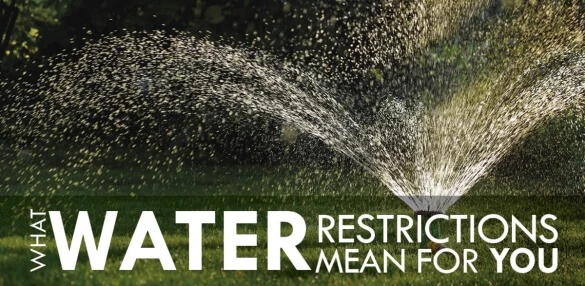
The Grounds Guys explain how local water restrictions impact homeowners and offer practical steps to comply.
|
During a drought, the state or local government may establish outdoor water restrictions. If the state establishes baseline rules, the local government may enact further restrictive measures if deemed necessary. Learn more about what local water restrictions and bans mean for you.
Why Restrictions are Put in Place
You may initially be upset at the idea of water restrictions, but it’s very important to follow them. Water bans are often enacted for the following reasons:
- Drought: Sure, your lawn may turn yellow when you abide by the local water restrictions during a drought, but you help reserve water for more essential purposes, such as drinking, showering, cooking, flushing toilets and fire fighting. After all, with drought comes the increased chance of natural and man-made forest fires, which can devastate entire communities.
- Problems with the water source: The water main might break or the water tower or reservoir in your area may experience a malfunction. If this happens, a water restriction may be established on a very local and temporary basis.
- Permanent water shortage: Some water restrictions are permanent because increasing populations create a continuous water shortage. In some places, outdoor water use is restricted to recycled grey water to preserve fresh water for human use.
What Various Restrictions Mean
Water restrictions vary greatly depending on the severity of the issue that caused the ban in the first place. They affect all sorts of outdoor recreational water use, including:
- Lawn irrigation and the use of broken sprinkler heads that “water” paved areas
- Car washing
- Swimming pools and water slides
- The use of water to clean paved areas
Specific types of water use restrictions you may come across include:
- Odd/even lawn watering restrictions: This is when homes with odd-numbered addresses are only allowed to water on odd-numbered dates, and even-numbered addresses can only water on even-numbered dates.
- Day-of-the-week restrictions: This is when everyone in the area may only use outdoor water on specific days of the week.
- Time-of-day restrictions: This restriction relates specifically to the time of day people can use water. It often prohibits lawn watering and other outdoor water activities between late morning and early evening.
Businesses that rely on water for their operations – such as car washes, landscaping companies or greenhouses – are usually not exempt from these water restrictions. Any individual or business that ignores a ban is first given a warning followed by a fine. If they continue to use water inappropriately, the local water authority may cut off the home’s or business’s water supply entirely.
Where Certain Restrictions are More Common
Residents living in desert regions of the US are more likely to experience water bans. The specific states with the most stringent outdoor water use restrictions include:
- California
- Nevada
- Arizona
- New Mexico
- Texas
The US Drought Monitor shows that the entire state of California is currently experiencing a historic drought. Officials tightened regulations more than ever on July 29, the same day millions of gallons of water dumped from a ruptured water main near the UCLA campus. The current restrictions include:
- Hosing down driveways and sidewalks is prohibited.
- Watering outdoor landscapes is banned if it causes excessive runoff.
- Decorative water features are prohibited unless they have recirculation systems.
- Hose-washing a car is only allowed if the hose is fitted with a shut-off nozzle.
- The regulations remain in effect for the next 270 days and offenders are subject to a fine of $500 per day.
Even if you don’t currently have water restrictions in your area, it’s smart to make conservative water choices every day. Please contact The Grounds Guys® to learn water conservation tips.